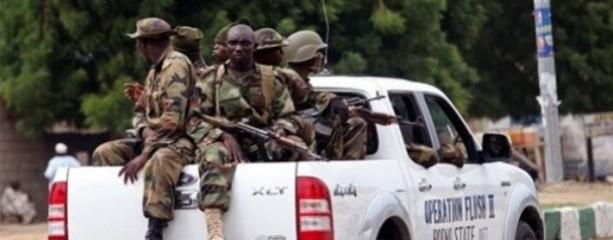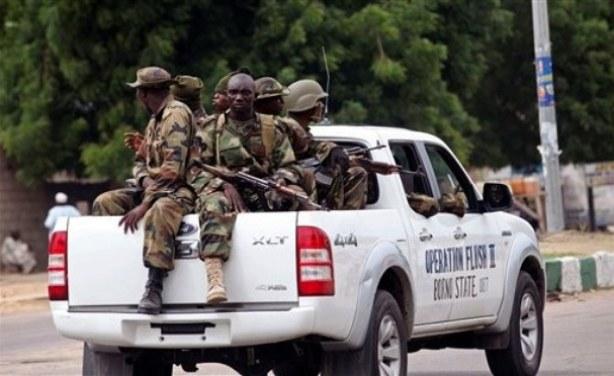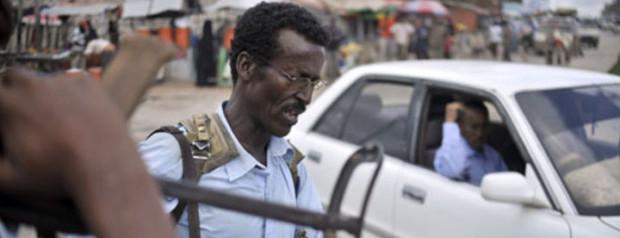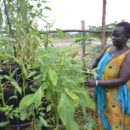Is it time for a more serious response to Boko Haram? – R. Bennett Furlow


Nigeria’s ‘Joint Task Force’ (JTF) has so far been ineffective at suppressing Boko Haram attacks in Borno and Yobe states.
The conflict between radical Islamists and the government of Nigeria is little noted in the United States compared with the attention paid to that in Somalia, where al-Shabaab militants have battled what little federal authority exists there for the past nine years.
In the past two weeks, more 300 people have been killed by Boko Haram guns and car bombs including last month’s brutal assault on a boarding school in which 59 students were murdered.
The Nigerian government’s currently rather tepid response shows that it is uncommitted to defending its people and quashing this significant threat. President Goodluck Jonathan is doing just enough to look like he takes the situation seriously but not enough to be effective. Last May Jonathan ordered the army to launch an operation against Boko Haram, but it proved largely unsuccessful.
As tragic as the situation is for the Nigerian people, especially those in the Muslim-dominated northern part of the country where Boko Haram operates, it also poses international dangers. For years, Islamist al-Shabaab fighters in Somalia only sought to impose their will on that country. They were primarily nationalists who showed no interest in the kind of worldwide jihad that characterizes al-Qaeda.
That has now changed, as was seen tragically in last September’s shopping mall attack in Nairobi, Kenya, in which 67 civilians and Kenyan soldiers were killed by al-Shabaab fighters. Al-Shabaab has morphed into what amounts to an al-Qaeda franchise that could strike anywhere in East Africa.
That could become a model for Boko Haram if the Nigerian government, with the help of other African and Western countries, does not stamp it out soon. Today Boko Haram has nationalist goals of creating an Islamist state in northern Nigeria. But if it shifts to regional jihadist goals, it could threaten neighboring Cameroon and Chad.
It is believed that Boko Haram receives some funding from outside jihadists groups, which likely comes with encouragement to broaden its horizons. As with al-Shabaab, what is local today can become international tomorrow.
The name Boko Haram means “Western education is forbidden,” and the group rejects all things Western from clothing to democratic elections. From its founding in 2002 by Muslim cleric Mohammed Yusuf, who literally believed the Earth to be flat, it was anti-government but not violent. That changed in 2009 with a series of bloody attacks on government buildings and police stations across several Nigerian cities. The violence raged for days, leaving more than 1,000 people dead. Yusuf was arrested and executed without trial.
Though most of the Boko Haram attacks have been against government entities or Christians in churches or villages, mosques also have been attacked and Muslims killed. The group’s members adhere to a takfiri ideology, which approves meting out justice to Muslims, including clerics, who are not viewed as being sufficiently faithful to Islam.
The assault on the Buni Yadi boarding school was carried out in the middle of the night. Gunmen entered hostels where the boys, aged 11 to 18, slept, set the buildings ablaze and opened fire with automatic weapons. Some students were able to flee, but their bodies were found outside with their throats slit.
Even if the Nigerian government commits itself to defeating Boko Haram, it will not be easy. Nigerian forces – some of whom have been accused of human rights violations of their own, such as executing people believed to have aided Boko Haram – could drive the militants out of the hills and forests they inhabit near the borders with Cameroon and Chad. But the military cannot follow them across the borders.
US Secretary of State John Kerry has said that Nigeria is receiving assistance in cracking down on what the United States considers a terrorist organization. Whether that assistance has any real muscle behind it is questionable, given the feckless approach of Nigeria’s own government to date.
The Boko Haram threat should not be taken lightly by the Nigerian government or the international community, including the United States. Nigeria is the most populous country in Africa, the fifth largest in the world, and it is the continent’s leading producer of oil. It is important in its own right, regardless of whether Boko Haram expands beyond its borders. The government in Nigeria needs to more openly acknowledge the problem, be honest about their failings, and accept help in order to deal with it. If not, we see tragedy after tragedy coming out of Nigeria.
R. Bennett Furlow, Ph.D., is a researcher at Arizona State University’s Center for Strategic Communications who focuses on Islam in Africa.







It’s puzzling that they are focusing their attacks on the North. Their 2009 statement said they would be targeting the South. OTOH, maybe they’re neither rational not organized!
Attacking the South is calling for war. ‘They’ know that, besides ‘they’ have too many interests in the South.
A few things.
1. There’s no concrete evidence that greater US involvement will make things better. Instead, it tends to make things worse (e.g. Somalia).
2. Nigeria has an internal security problem, we don’t really have a police force that is fit for purpose (police should be the first line of defense against terrorists) – & you can’t reform internal security in the midst of an insurgency.
3. The author jumps to conclusions – far too many conclusions. The Nigerian military is simply not up to the task. We saw their performance in the Niger Delta. If we didn’t have some form of negotiated settlement there, they’d still be fumbling in the Niger Delta.
4. In 2012, Boko Haram could extend as far as Kano. Today, they are confined to a smaller area. This is progress.
5. It took the British Army years to get a hang of IRA. A counter-insurgency fight is not like writing another academic paper.
6. The Nigeria Army is dealing with security situations in 32 out of 36 states (dormant Niger Delta Militancy, kidnapping in South East, ethno/religious clashes in the Middle Belt).
It is over stretched.
Nigeria is tearing at its seams, it is a failed state. It has structural weaknesses that are coming to the fore. There’s no point propounding ivory tower theories when government institutions are in terminal decline.